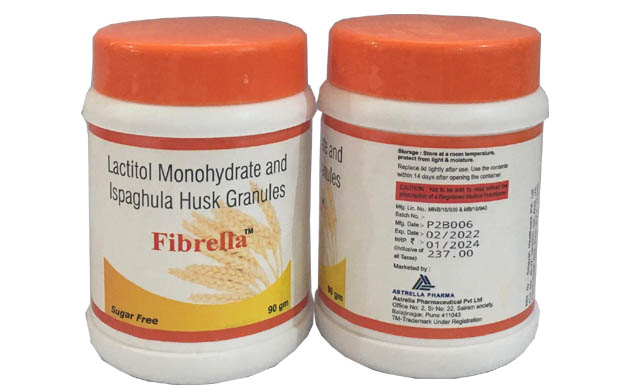Sachet Presentation
Each 15 g of granules contains:Lactitol Monohydrate BP 10 g
Ispaghula Husk IP 3.5 g
This combination is provided by combining a bulk-forming laxative in the form of psyllium husk (Ispaghula husk) with an osmotic laxative such as lactitol for Idiopathic constipation and is used to prevent or treat constipation. Not eating enough fiber or not drinking enough fluid can cause constipation. It is a common problem for adults and pediatric patients and can generate considerable suffering for patients due to both the unpleasant physical symptoms and psychological preoccupations that can arise. Lactitol is an osmotic disaccharide laxative that increases fecal volume and stimulates peristalsis whereas Ispaghula husk helps relieve constipation and as a laxative, works by increasing the bulk of stools, which encourages bowels to move the stools through digestive system, which in turn relieves constipation.
Uses
- Inflammatory bowel disease or other types of diarrhea
- Irritable bowel syndrome
- Anorectal disease
- Chronic cholecystitis
- Prevention of hepatic encephalopathy
- Haemorrhoids
- Fissures
- Constipation
Mechanism of Action
Psyllium husk is comprised of dietary fibre which, when mixed with water forms a gel-like mass that works as a mild laxative. This gel-like mass subsequently moves down a patient's digestive system and makes stools softer by increasing their water contents. At the same time psyllium seed lubricates the intestine, which improves the transit of stools. Moreover, as the presence of the gel-like mass increases the stool bulk it also increases the tension and/or the stretch stimulus in the bowel wall which serves to trigger bowel movements.Lactitol may be used as an osmotic laxative because it is not absorbed in the small intestine and is thereafter hydrolysed and fermented in the large bowel by the action of intestinal microflora resulting in the liberation of galactose and sorbitol which are thereafter metabolized to organic acids and short chain fatty acids by colonic anaerobes. An osmotic effect is created in the colon, which normally acts to hydrate the fecal stream. The reduction in the dehydrating action of the colon produces a softer, bulkier fecal stream. Lactitol exhibits other properties which makes it a preferred candidate for combination with psyllium. Specifically, lactitol does not induce an increase in blood glucose or insulin levels and contributes half the calories of most other carbohydrates (2 calories per gram). Because the control of blood glucose, lipids and body weight are primary goals in diabetes management, lactitol is considered to be a beneficial product for diabetics. Lactitol is also non- cariogenic and has a moderate, sugar-like sweetness. Lactitol also has good solubility, low hygroscopicity, and when provided in a crystalline form, is suitable for dry mixing.
Side Effects
The product is possible safe for most adults. There is no disadvantage associated with the product if taken under the recommended usage however rectal irritation, headache, temporary increase of flatulence and abdominal distension can occur in some patients.Contraindications
- Not be administered to patients with
- Intestinal obstruction
- Fecal impaction
- Colonic atony
- Hypersensitivity to Ispaghula or Lactitol
Storage
- Store below 30°C
- Store in air tight container
Disclaimer: The data uploaded is made from content already available on internet.The company holds no right of it and is not responsible for any wrong information.
Know About new DCGI Approved Products
Copyright © by Alaina Pharma. All rights reserved.
Created by Alaina Pharma
